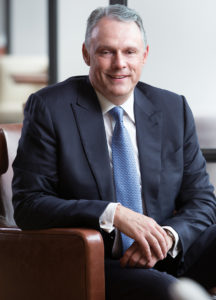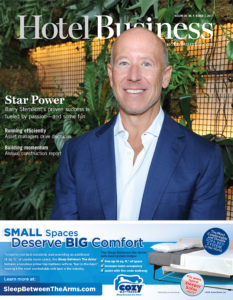 With a goal to “Create Memorable Guest Experiences with World Class Brands,” Paul Wischermann in 2002 founded Wischermann Partners with a focus on development, operations and acquisitions. Its portfolio includes flags flown by Westin, Le Méridien, Sheraton and Courtyard by Marriott.
With a goal to “Create Memorable Guest Experiences with World Class Brands,” Paul Wischermann in 2002 founded Wischermann Partners with a focus on development, operations and acquisitions. Its portfolio includes flags flown by Westin, Le Méridien, Sheraton and Courtyard by Marriott.
Prior to launching his eponymous firm, the industry veteran served with Carlson Hospitality Worldwide. As SVP there, he developed a lifestyle community concept and pursued growth opportunities for Regent Hotels International and Radisson Hotels and Resorts Worldwide. He also introduced a subsidiary of Carlson into the European marketplace, leading the development, operational and marketing implementation.
Wischermann’s other experience includes being GM at Germany’s Parkhotel Oberhausen, and positions in F&B at the Two-Star Michelin restaurant, The Terrace, at The Dorchester Hotel in London and the One-Star Michelin restaurant, Die Ente vom Lehel, at The Nassauer Hof in Wiesbaden, Germany. Both hotels are members of The Leading Hotels of the World.
Wischermann Partners is marking its 15th year in business in 2017. What gave you the confidence to launch in 2002, a particularly challenging time for the industry? Probably the main factor was the limited amount of opportunities available in the corporate hotel industry at that time did not align with my entrepreneurial spirit.
From then till now, the industry has twice seen drastic downturns and record profitability. How has the company been able to ride that roller coaster to the advantage of the company and its hotel owners? We have always been focused on the guest experience. In order to create memorable experiences, we pair exceptional product design and functionality with a culture of service excellence. This has never changed in the downturn, nor do we lose sight of this during good years. People are what matter most. We did not scale back our corporate team during the last recession and, now, we are growing it to take advantage of these great economic conditions. Our owners benefit via consistently high ADR premiums, which create higher returns.
Does the company have any equity—sliver or otherwise—in the properties it manages? If so, what advantage does that bring? If not, why not? We prefer not to. It complicates exit strategies. Alignment of interest can always be structured via incentive plans and performance hurdles.
Most of your properties are full-service in the upper-end segments. Any interest in select-service? We are clearly focused on the operations of upper-upscale and luxury hotels. Maybe, in certain urban locations with an existing partner, it may happen.
Your portfolio is heavily weighted with Starwood, now Marriott, product. How has the recent merger influenced your thoughts about adding legacy Marriott brands to the mix and what might be a good fit? The integration has been executed flawlessly so far, understanding that a lot of heavy lifting, in respect to technology and systems, is still to come. We are very excited about the opportunity to market the largest loyalty platform once it is launched. Marriott International already had a large selection of upper-upscale and luxury brands pre-acquisition and now the opportunities to partner have become even more attractive.
You recently opened The Westin Nashville (TN) and are set to open The Westin Jackson (MS), both new construction. What impact do you see these properties having on their respective markets? These markets are very different, but interestingly enough, both Westin properties are located near a convention center. The properties increase the desired room count for visitations although, again, the scale is quite different. While The Westin Nashville opened into one of the strongest markets nationwide, The Westin Jackson reintroduces the city of Jackson as the central meeting place in the state. These two Westins are stunningly beautiful and offer very relevant food and beverage solutions, from rooftop bar with craft beverages to wine bar and open-kitchen concepts. Both properties offer signature resort-style spas and state-of-the art fitness facilities.
Where do you see new frontiers for Wischermann Partners (e.g., new locations, adding soft brands, technology) over the next two to five years? We believe that opportunities exist from coast to coast. The micro-conditions in a certain submarket are most important. We are focused on markets like Los Angeles, Chicago, Pittsburgh and Washington, DC. Upper-upscale and luxury hospitality has, more than ever, the opportunity to differentiate. Guests want what they want and when they want it. Service needs to be delivered in an intuitive and uncomplicated way. Our service culture and innovative food and beverage solutions are most relevant in delivering on these expectations.
The industry is continuing along a robust path. How would you characterize the company right now in how it’s anticipating the next 18-24 months? We share the positive economic sentiments in the economy. The conditions are right to develop ground-up, upper-upscale or luxury hotels in select markets. We see potential for more rate growth and this leads to better experiences.
Over the years, what has surprised you the most about running your own company? While many things change, the most important thing never has: We are in the people business. Sometimes, it amazes me that we focus on so many things and not enough on our most important asset, our people. HB

